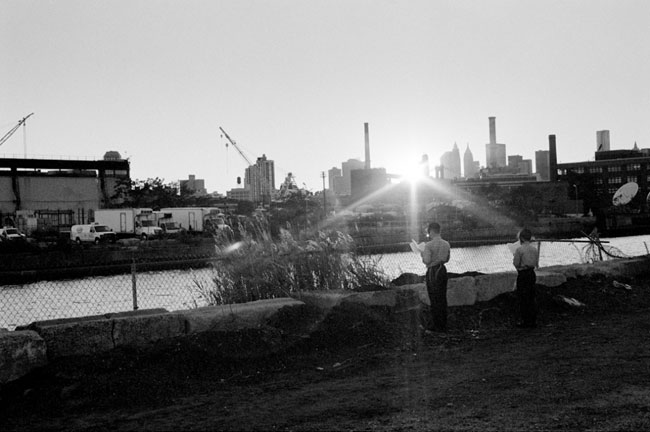Come Back, Metropolis - by Kyra Simone

People come and go from cities in waves. You wash in or out of whatever place in whatever season, perhaps marking your arrival by the comrades you come in with, missing or liberated from what you’ve left behind.
Then there are those who return to places we’ve already known, where past lives have been played out and left buried in memory, to be suddenly revived or reinvented. After nearly two years sojourning in Paris, I’ve recently resettled in my old town of New York. I ride the train with the stops and connections of another city still hanging in my mind, the geographies of all my places melding into one confused landscape.
As winter in the city plunges closer to the end of its erratic cycle – a day of snow, then a day of sun – I try to weave myself back into the infamous crowd, passing among the bare trees and war-time faces, squinting against the wind as we all hunger for spring. I often think of “The Cop and the Anthem,” the O. Henry story from 1904, which tells the tale of a New York city hobo who tries to get thrown in jail just so he’ll have a place to sleep for the winter. And as we lumber on through this season of longing, flashes of black and white still permeate the crowd. The original archetypes steady the stream, forever in the background against the rush for new colors.
They were together and not together, statues at the helm of the first train car headed for Coney Island. He sat himself down as soon as there was an empty seat, not even thinking of first offering it to his wife. She stood far away from him against a pole by the door, her long young face the only bare part of her showing. The train sped towards the lettered avenues away from town, on to the circus beach, trashed with mermaid memorabilia and scoops of ice cream lost in the sand. The man and his wife rattled on in silence, both staring off in different directions, completely unconnected, though the fact of being married to each other made them the most intimate they were allowed to be with anything.
The woman grew duller as one’s eye traveled down her body, beginning with the hint of color in the silk scarf tied around her head, printed with a single pink flower over her ear. Then came the bit of fur at the collar of her matronly coat, which continued to the floor over legs wrapped in dark stockings, held still at the base with mouse-footed flats. She usually walked alone in the street, alone with her five identical children, the same face made in diminishing order, trailing along behind her like a set of Russian dolls. They all kept silent as they went, a mute people dressed in God’s uniform, moving like animals emerging from the forest, stunned by all the strange lights on the road.
He sat with his legs apart, surely being pondered by someone in the crowd, for the inconspicuous locks of hair at the sides of his face, or the white ropes at his belt, only worn in obedience of his religion. How could they know he was waiting to be plucked up to the heavens, to be dangled over divinity by his own twisted knots. He looked a full decade older than his wife, while others of his kind seemed like boys beside the womanly bearers of their children. They all worked in the big stationary shop in Brooklyn, versions of the same man appearing behind shelves and counters throughout the store. It was only late in the evening that any of them were revealed as themselves, laid naked with their wives, if only in the shadows. But lately, when he combed his fingers through the woman’s hair, it only felt like so many stacks of paper shredded through the day…her eyes, the eyes of a customer he knew well.
The train carried on through a wasteland of patchwork buildings and broken signs in the distance, moving slowly over the track like an old roller coaster, as it shrieked up to street level and then dipped below the surface. A pigeon flew into the dark of the tunnel before them, as if abandoning its life above ground. And it was known in a moment. Someday, they would stand on the shore of a lake, both turning grey with fistfuls of crumbs, theirs the only hands the swans would feed from. The woman would still be hidden in the same black coat, still apart from her husband seated in the only chair, reaching into his pockets and wagging his cane. The birds would surround them like some celestial arrival, fanned out from the smallest specks to the greatest beauties, all flocked on the shore before they took flight.
But here, in the crowd, on this last day of snow, the long ride home only brought silence upon them, whatever thoughts of whatever things floating off in whatever directions. Tomorrow the woman would wake to a roaring wind, and mistake it for the waves of a distant sea.

You must log in to post a comment.